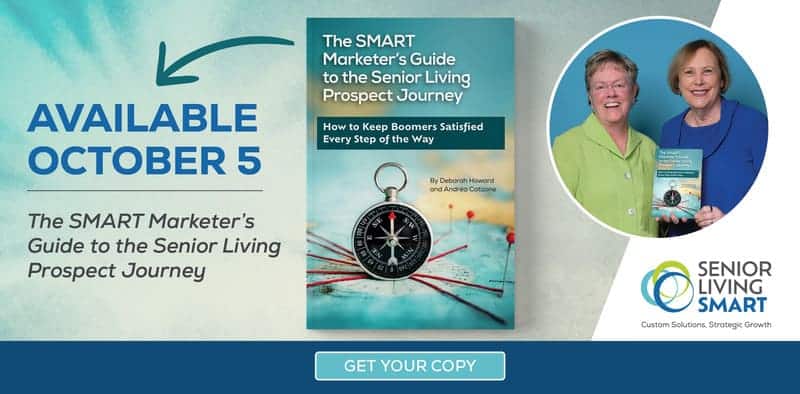Paid Search vs. Organic Search for Senior Living Lead Generation
If boosting senior living lead generation is your main objective, you might be wondering which tactic is better: paid search or organic search. Like most things in life, the answer isn’t clear-cut. Both tactics have merits.
Below, we’ll discuss the following:
- Definition of paid search and organic search
- The benefits of paid search and organic search
- Challenges associated with each
- How both can affect your lead generation efforts
What is paid search?
When people go to a search engine like Google, they type in their query (e.g., “senior living communities near me”) the search engine produces the “search engine results page” (the SERP). At the top of this page, you’ll see paid listings followed by organic listings.
With paid search, you pay the search engine to display your ads at the top of the SERP. You choose the search terms (the keywords) that you want your ad to show up for. As Google explains, you’ll only be charged when someone clicks on the ad. (This is a simplified explanation, of course!)
Some keywords are more competitive than others, and you need to compete with other businesses for them by bidding and winning an auction. As Google notes: “The exact prices are determined by how many other businesses are bidding on the same keywords.”
That gives you the general gist. As its name suggests, paid search is a pay-to-play scenario.
Now, let’s discuss organic search.
What is organic search?
As the name suggests, organic search results are the “natural” or unpaid listings on the search engine results page (SERP).
In other words, you don’t pay to have your site show up on the SERP. It happens naturally because the Google algorithm has deemed a particular web page from your site as highly relevant to the searcher’s query.
How do you get your website pages and blog posts to show up in organic searches? By optimizing them. This is referred to as SEO, or search engine optimization.
SEO involves both on-page and off-page tactics. On-page elements include things like writing compelling content around specific keyword phrases. Off-page elements include things like how fast pages load and whether the site is mobile-friendly.
Again, we’ve simplified this explanation. You can read more about SEO for senior living here.
What are the benefits of paid search?
Increases visibility
People pay attention to what shows up on the first page of Google, which is where those all-important paid ads are located. In fact, according to marketing wizard Neil Patel, 75% of people will never scroll past the first page of Google results.
Boosts brand awareness
A popular tactic with paid searches is making sure your ads come up when people google your competitors’ names. Someone googling a competitor might be looking for something specific, like a phone number to reach a resident. But some folks might be googling because they heard about the community, and they’re interested in touring. (Meaning they’re a good prospect for your community!)
Here’s the thing: If your ad comes up when they google the other community’s name, their eyes will see your ad. They might not act on it. They might not even be aware they’re seeing it. But your name will register on a subliminal level. And if they DO notice your ad, they might click it instead of going to the competitor’s site.
Can quickly drive traffic to your website
Paid search, when done right, can drive traffic to your site quickly. Which is the point. The “done right” part is critical—and one of the inherent challenges (more on this below).
What are the benefits of organic search?
Cost-effective
Yes, it takes work to optimize your website. And you’ll need someone to do the work, whether a staff member or an outsourced marketing agency like ours. And while SEO is never truly done . . . if you’ve optimized your website and you do a good job of optimizing all new content that you publish (like blog posts), it will likely be a more cost-effective strategy in the long run.
A preferred option for some searchers
Not everyone trusts or pays attention to ads. In fact, according to End Point Digital, “70-80% of all searchers ignore paid ads and focus on organic results only.”
With effort, you could outrank competitors—naturally
Again, optimizing your site for organic search is a marathon, not a sprint. But if you put the time and effort in, the work can pay off by outranking your competitors in the organic search listings for a variety of competitive and long-tail keyword phrases.
Helps build website authority and brand authority
The more web pages and blog posts that rank well in Google, the better overall authority your website will have—which can further boost newer pages and blog posts. It’s a positive domino effect.
Challenges associated with paid search & organic search
The biggest challenge for one tends to be an advantage for the other.
For paid search, the biggest challenge is usually budget. You need to pay to play—and often you need to pay big dollars to get the momentum and ROI you’re looking for. You also need to pay someone to manage your ad campaigns. (We don’t recommend setting them and forgetting them.)
Organic search optimization requires someone to do the optimization work. So there is an initial cost (and that’s true whether you use a staff member or outsource to an agency like ours). But if you’ve done a good job optimizing your web pages and posts, they will continue to work on your behalf—even if you don’t invest much in them moving forward.
For organic search, time is the bigger issue. You need to devote a lot of time to optimizing your site. Not to mention, it can take time for pages to rank. On the flip side, with paid search, you could set up a campaign today and see traffic to your site right away.
Which one should you use for your senior living lead generation efforts?
Like all things in life and in marketing—it depends.
Things to consider include the following:
- ROI and budget. In order to figure out ROI, you need to understand the total revenue generated by a customer (in senior living, it’s a resident, and that total revenue can come in over months or years). When you know that number, you can justify (or not) budgets and costs for paid search vs. organic search.
- Time. Do you have the time, staff, and expertise to work on optimization? Do you have the budget to farm out this work—perhaps in addition to running paid search ads?
- Immediate goals. If you’re looking to drive traffic to something specific and perhaps urgent—for example, the opening of a new community or a time-sensitive event at your community—running a highly-targeted ad campaign could make sense. If you’re looking to bolster brand awareness, especially against your competitors, a paid ad campaign would also make sense.
Usually, we don’t recommend one over the other. With most of our clients, we work on ongoing organic search optimization—which should be happening whether you run paid ads or not. Then, if it makes sense for the client’s budget and goals, we build out specific paid campaigns.
Keep in mind that paid search isn’t the only “pay to play” game in town. Paid social media advertising is another tactic, one that can be used instead of or in addition to paid search ads.
Is your head spinning? We can help.
Maybe you’re overwhelmed by everything we wrote above. Or maybe you simply want a fresh take on your current paid ads and organic search efforts. Either way, we can help! We have paid search and SEO specialists on our team who can work magic on your campaigns and organic search results. Get in touch and let’s talk.





